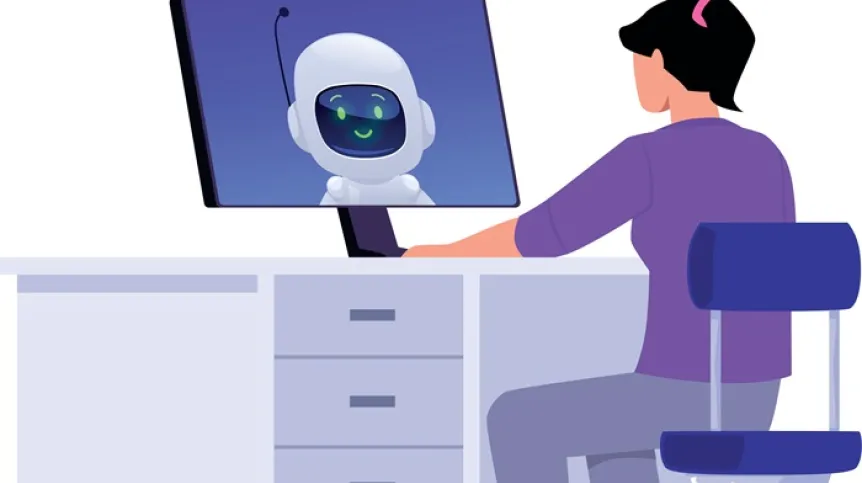
Children are growing up in a digital culture shaped not just by screens, but by frequent interaction with artificial intelligence. According to Ada Florentyna Pawlak, PhD — a technological anthropologist and lecturer at SWPS University — the progressive humanisation of AI tools, including chatbot companions, may have far-reaching effects on how the youngest generation thinks, feels, and relates to others.
- How do you feel when you hear that someone is 'falling in love' with a chatbot or even 'gets engaged' to an AI companion (an AI tool designed to interact with humans)?
Ada Florentyna Pawlak: Ada Florentyna Pawlak: This saddens me because it shows how far we have shifted the concept of normality in our culture. 'Falling in love' with AI companions demonstrates our complete lack of mental resilience to criticism and the fear of rejection, hurt, or harm.
- Where does this fear come from?
TThis is a consequence of growing up on social media, where people encounter hate, jealousy, and ghosting (suddenly breaking off contact with someone without any explanation - ed. PAP). For me, it is also proof that we, as the generation introducing social media and AI-based solutions, have not introduced any appropriate regulations, we are not educating, and above all, we keep entrenching ourselves in a culture of individualism and capitalism, creating a world based on separation, competition, and perpetual insatiability. We have failed to create a culture that cares for the psychological well-being of its citizens while simultaneously ensuring the sustainability of society.
What could this result in?
TThis is already affecting the definitions of love, friendship, and responsibility for someone. I think we are in for a revolution - an empathetic revolution and a broader transformation of the value system in the younger generation. The way we attribute intentions to others will change. New grammatical categories may emerge, expressing degrees of reality in experience, that is, whether something is real or artificial. There will be differences in cognitive and narrative competences. A situation may arise where the human species will have different languages and ways of communicating content.
Our language, our ways of narrating the world and constructing stories will certainly change as well. If the youngest generation learns to tell stories primarily through dialogue with chatbots, we can expect several significant changes. First, narrative language will become more dialogical, with more questions, retorts, and exchanges replacing continuous descriptions. Young people learn to tell stories in turns: question, answer, acceptance/rejection. This shifts the proportion of narratives towards conversational forms. Secondly, the line between spoken and written style may become blurred, children will begin to write as if they were talking to a machine.
We will likely also observe greater flexibility in linguistic styles and registers, but also their chaotic nature. There may be a tendency to accept information without verification if it is presented in an attractive, narrative form on screen. Narratives may become more modulated by the structure of the interface, and the rhythm of the question-and-answer sequence will influence the plot. 'Chat fiction' forms, narrative scenarios co-designed with bots, and platform memetics will create new literary and communication genres.
Furthermore, as a result, our children will learn to think in tandem with machines, rather than on their own. And, of course, these will be different thinking styles. Differences in the types of use and competence of prompting (the process of asking questions or giving instructions to language models to generate desired content - ed. PAP) between socioeconomic classes will ensure that only the privileged will benefit from AI skills, which will deepen the gap in narrative and cognitive competences.
- Are we playing a losing game?
I think not. The most important issue today is the promotion of knowledge about artificial intelligence and artificial empathy at every level of education, as well as among parents and guardians. This is especially important given that awareness of the new emotional worlds into which young people are migrating is still very low among older generations.
It is also important to remember that the aforementioned AI companions and artificial empathy offer mental health and social well-being benefits - but as a complement, not a replacement for human relationships.
- Is artificial empathy, understood as tools like AI companions, a broader research topic for the anthropology of technology?
Yes, and it is a fascinating topic. The young generation, so-called AI-natives are learning to tell stories by conversing with nonhuman beings. This raises many questions in the area of the anthropology of emotion and ritual (AI as a new partner in everyday communication rituals).
We are also observing a number of new phenomena in the area of digital rituals and ceremonies, such as 'AI initiation' - first contact with a companion (around age 13); 'bonding rituals' - daily communication routines; 'digital mourning' - mourning the 'death' of an AI companion; and 'upgrade celebrations' - celebrating AI improvements.
We also have neuroanthropology, which studies brain changes caused by long-term contact with AI.
I am extremely curious about the consequences artificial empathy will have in the coming years for language (narrative structure, pragmatics, style) and thinking (schemata, epistemology, memory, planning).
The challenge, however, is the duration of scientific research projects, which typically take several years. Development of technology, however, is so fast that by the time results are published, they may already be outdated by new developments.
* Ada Florentyna Pawlak specializes in the social context of new technologies and lectures at SWPS University.
Interview by Agnieszka Kliks-Pudlik (PAP)
akp/ agt/ amac/













